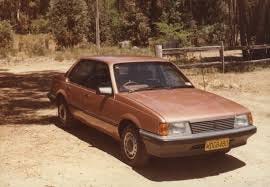I was ten years old, walking out of school on a disgustingly hot Brisbane afternoon. I'd timed it perfectly. School bell rings, I bolt. Head down, backpack bumping, praying no one sees me.
Especially not Sarah from 7B. Or anyone from my year level, really.
Why? Because of our car.
We owned a 1984 Holden Camira. Brown. Not a classy chocolate brown, more like murky-Brisbane-river-on-a-bad-day brown. The fake leather seats stuck to your skin. No air con. It was a toaster on wheels.

That day, I got in the car, ashamed to be seen in it.
But something was different.
Mum looked tense. Not tired. Not angry. Just... off.
She checked the mirrors twice. There was a twitch in her shoulders. She was nervous.
Then the gearstick crunched.
We turned left. Not the way home. And I knew: we were getting on the highway.
Mum didn’t do highways.
We were small-streets people. School runs. Doctors. The local shops. Newsagent for our weekly 50c lolly bag.
The highway was for other people. People with cars that had working radios.
But that day, she merged. Gripped the wheel. Breathed deep. And went.
Ten minutes later, we pulled up at the Kenmore netball courts.
I opened the door and nearly kissed the ground, like Katy Perry returning from space.
That was my first rep team trial. The first time I’d had to leave the suburb to chase something. The first time I saw my mum do something that scared her.
And it hit me: this wasn’t about transport. It was about courage.
What we inherit (without knowing)
My dad’s Welsh. My mum’s from Papua New Guinea. I was born at the Mater Hospital in Brisbane, so, not that exotic.
At seven, my mum lost her mum to a snake bite. Just like that, her childhood was over. She grew up fast.
She used to tell us, “You don’t know how lucky you are to have a mum.” Back then, I didn’t really get it. I do now.
She later went to one of PNG’s first Catholic schools, Our Lady of the Sacred Heart, Yule Island — run by nuns I never met but feel like I did.
They taught her how to iron (collar first), advised her to never talk to boys, that hard work and discipline win the day.
And of course something they kept reiterating: Never, ever, talk back.
Fast forward to me, the same age, calling into B105’s talk-back radio every night trying to win Hanson tickets.
Different lives. But weirdly, I think those nuns helped raise me too. Through her. Their values shaped her. And her values shaped me.
Steve Jobs was right. You can’t connect the dots looking forward. You can only see them looking back.
Netball was never the plan
Driving to the event where I gave this talk, I asked myself, “Why am I standing on this stage today?” The answer: my mum.
Not just because she gave me life. But because she signed me up to play netball.
I cried. Full meltdown. I was a book kid - you could only find me with my head in the books reading Judy Blume, The Babysitters Club.
I didn’t want to play sport!
Then I remember catching that ball during my first training session and everything shifted. I loved the game.
I played across Queensland, nationally, even internationally — with a full-circle moment representing Papua New Guinea.
One of my toughest games? Against Dee Turner, a former Firebird who now teaches at this school (St John Fisher College). That connection is one of the reasons I was invited to speak.
Where's the manual for daughters?
As John Farnham sings, “We’re all someone’s daughter”.
But have you ever woken up and thought, “Today, I’m going to be a better daughter”?
Didn’t think so.
There’s endless advice on how to parent. But no one teaches us how to daughter. There’s no manual. No checklist.
But here’s what I believe: mother-daughter relationships are partnerships. And good partnerships go both ways.
I’ve been a consultant, podcaster, and author. But the role I’ve held the longest? Daughter. Forty-one years. I should be qualified by now. Still, I’m learning.
Just the other week, I shocked mum by telling her I've signed up to climb to Everest Base Camp later this year. I've never done a multi-day hike before.
So yes, at 41, I'm still keeping her on her toes, just like some of you 15-year-olds might be doing with your mums right now!
Three things I’ve learned about daughtering (from playing netball)
1. Agility
Agility’s not just about quick feet. It’s about navigating contradictions without losing your footing.
Ever heard:
“You spend too much time on your phone” followed by “Why didn’t you reply to my message?”
Or
“We just want you to be happy” followed by “Are you sure that’s what you’re doing with your life?”
How do you get more agile? Resistance training.
And my mum was great at that!
Welcome to the dance.
Me: “I’m quitting my job to start a business.”
Mum: “Don’t do that.”
Me: “I’m moving to WA to be with a guy I just met.”
Mum: “Absolutely not.”
(Spoiler: I married him.)
She once said, “Leanne, you always wanted to try things. I just wanted you to be safe.”
That’s the line. The split.
Agility means you can hear the fear in their voice and still move forward. It’s the most underrated leadership skill on the planet.
2. Reset
In netball, if you miss a shot, you reset. You have to forget that missed shot before you attempt goal again.
When I’d mess up, I’d dust off my hands. That was my trigger. Start fresh.
Mother-daughter relationships have missed shots too. We say things we don’t mean. We react instead of respond.
The strength of the relationship isn’t about how few fights you have. It’s about how well you recover from them.
Psychologists call it repairability. It’s one of the biggest predictors of a healthy relationship.
Next time you clash?
Metaphorically dust your hands. Take a breath. Say, “Can we reset?”
Simple. Not always easy.
3. Vision
Good players don’t just see the ball. They see the whole court.
Being a daughter with vision means zooming out and seeing your mum as a whole human.
She wasn’t born a mum. She had wild nights out singing to Bon Jovi. Hypercolour shirts. Backpacking around Europe without internet, just a Lonely Planet guide.
She had her own heartbreaks and sliding-door moments.
Here’s a stat that floored me: by the time you turn 18, you’ve already spent 80% of the in-person time you’ll ever spend with your mum.
The rest? That’s bonus time. Use it wisely.
Start with one question. Ask about her life before you. Then listen.
Our highway
To recap:
Agility helps you handle contradiction with grace.
Reset gives you the space to move on.
Vision lets you see the person behind the role.
But more than that - this is personal.
These are my three ideas. But hey, you’re different! You've got a different mum. The only one like her in a world of 8.2 billion people.
I shared the story of how she took a highway she feared, in a car we all hated, so I could chase something new.
Now think about yours.
What road did your mum take - not for herself, but for you?
That’s what we’re really celebrating on Mother's Day. Not the greeting cards or the flowers, but the detours, the U-turns, the moments that changed everything.
Here’s to the women who got us here.
And to the daughters learning how to take the wheel.





